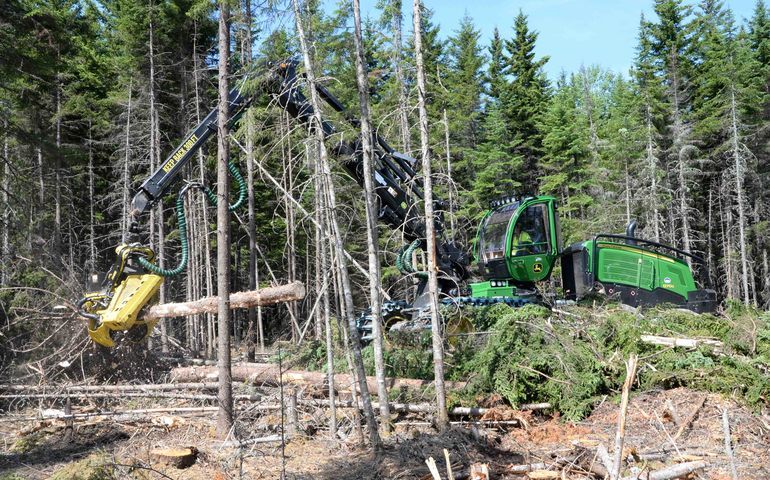
Forest industry seeks solutions as climate warms
 FILE PHOTO
The industry typically harvests when the ground is frozen. It’s looking for vehicles that can operate on softer ground.
FILE PHOTO
The industry typically harvests when the ground is frozen. It’s looking for vehicles that can operate on softer ground.
Maine’s forest industry typically harvests trees when the ground is frozen, but the warming climate is shortening the seasonal freeze.
“We’re trying figure out how to move forward with a shorter harvesting season,” Pat Strauch, executive director of the Maine Forest Products Council, said during a webinar hosted Thursday by the Maine State Chamber of Commerce.
The webinar, part of the chamber’s Economics of Climate Change series, explored the impacts of climate change on Maine’s economy.
Strauch, a coordinator of the Maine Sustainable Forestry Initiative, said the warming climate affects landowners, loggers and wood manufacturers.

On a positive note, he said, moderating temperatures are lengthening the forest growing season.
But harvest season is growing shorter.
Loggers, landowners and mills are “all chomping at the bit” to make sure they have enough wood.
The challenge is to find equipment that can operate on softer ground and the industry is looking at equipment elsewhere in the world that is outfitted with larger tires.
There are other concerns. Landowners are seeing more insects and diseases that are wiping out whole species of trees and now pose one of the greatest threats to the industry, Strauch said.
“Emerald ash borers are coming after our ash trees. That’s a serious concern,” he said. “How do we create more resilient forests?”
However, he continued, there are opportunities for the state to sell carbon offset credits, given its large forest resource.
Strauch said it’s estimated that Maine forests sequester 60% of emissions from petroleum products and Maine wood products sequester another 15%.
“That’s a great advantage we have in Maine,” he said. “Other regions are envious of that.”
The industry is also developing new wood products as a source of carbon storage. That includes manufacturers diversifying into wood fiber packaging material as the market looks to move away from plastics.
“You’re seeing more packing being made from wood fiber,” Strauch said. “That will be an opportunity for us.”
Additional investment
Maine manufacturers are developing wood construction products, such as mass timber to replace concrete and steel, along with siding and insulation. Another facility is developing biochar as a soil amendment.
Sawmills are looking at their energy use and installing boilers and turbines to generate their own energy from waste wood.
Strauch pointed out that the Mills administration recently announced a $14 million round of grants for forestry companies to support forward-looking projects that address new market demands, provide new sustainable products, or advance forestry's long-term stability.
The money comes from the Forest Recovery Initiative of the governor's Maine Jobs & Recovery Plan. The initiative was unveiled by Mills in November 2021 and aims to support Maine’s forest products industry and the people it employs, create and sustain jobs in rural Maine, and strengthen the state’s economy.
“The idea of the forest bio-economy is growing,” said Strauch. “It’s an opportunity to support our forests.”














0 Comments